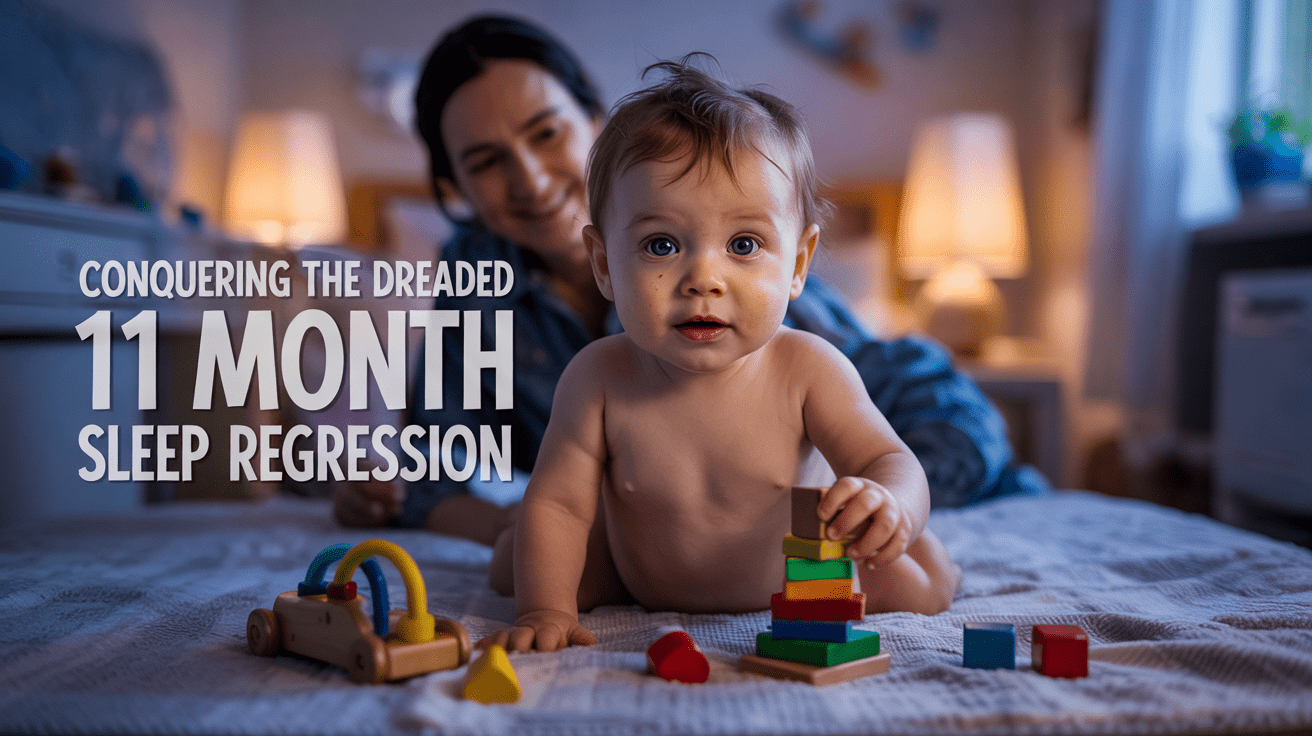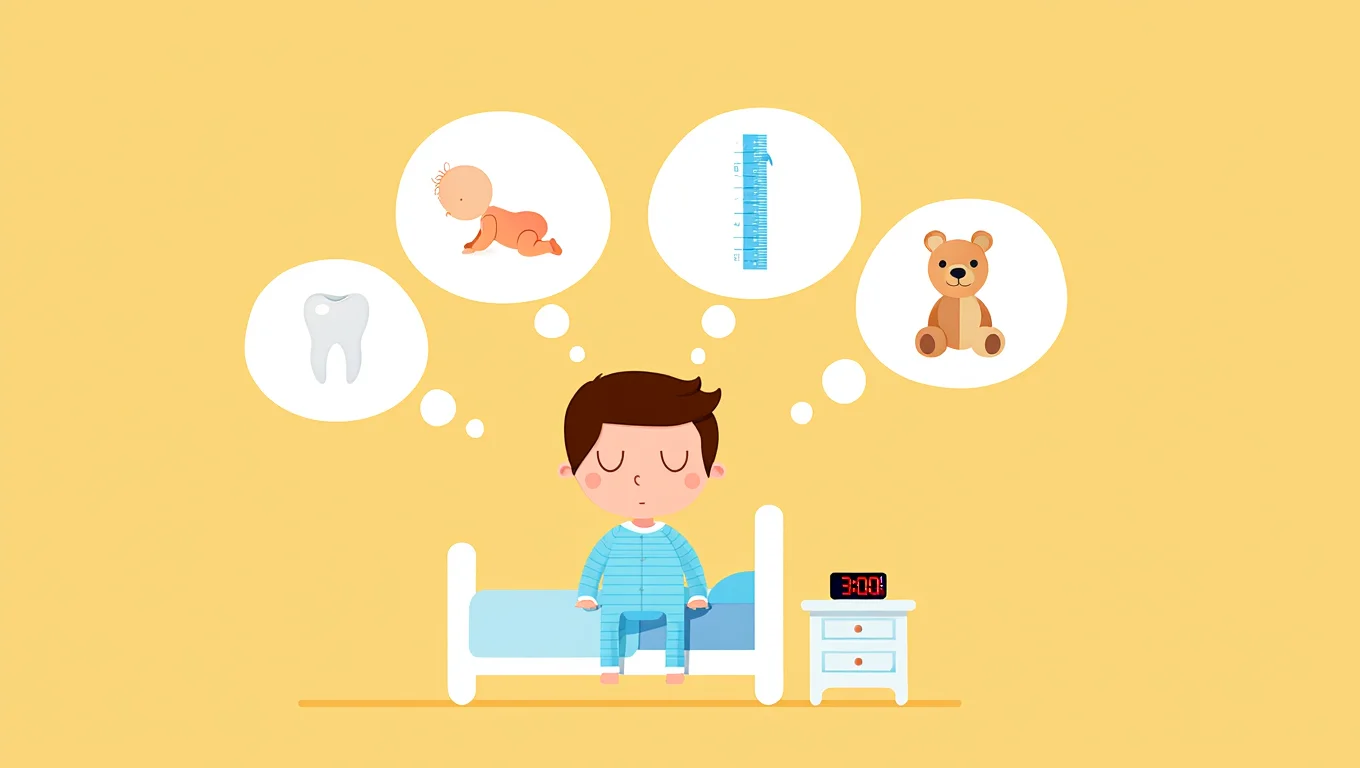
Just when you thought your baby’s sleep schedule was finally on track, the 11-month sleep regression arrives like an unwelcome houseguest.
Suddenly, your good sleeper is fighting bedtime, waking throughout the night, and taking micro-naps—if any at all. Don’t worry; you’re not alone in this exhausting phase.
This regression occurs at a unique developmental crossroads. Your baby’s physical abilities are exploding (cruising furniture, maybe even taking first steps) while their cognitive skills are advancing daily.
Unlike the 8-10 month regression linked to crawling or the 12-month regression connected to walking, the 11-month mark creates a perfect storm of sleep disruption.
The good news? This challenging phase is actually a sign of your baby’s amazing progress.
What’s a Sleep Regression?
Sleep regression occurs when a baby or toddler who was sleeping well suddenly starts waking up at night, fighting naps, or showing other sleep disruptions. These regressions typically happen at predictable times—often around 4 months, 8-10 months, 12 months, 18 months, and 2 years of age.
During these periods, children experience developmental leaps in areas like motor skills, language, or cognitive abilities.
Their brains are busy processing new information, which can interfere with sleep patterns. For example, a baby learning to roll over might practice this skill in the crib instead of sleeping.
Sleep regressions usually last 2-6 weeks before returning to normal. While challenging for exhausted parents, they’re actually positive signs of your child’s healthy development and growing abilities.
Why Does Sleep Regression Happen?

Sleep regression occurs when a child who previously slept well suddenly experiences disruptions in their sleep patterns. These regressions typically coincide with developmental milestones and neurological changes.
As babies learn new skills like rolling over, crawling, or talking, their brains process these developments during sleep, causing temporary disturbances.
Growth spurts and teething can also trigger discomfort that interrupts sleep cycles. Additionally, changes in routine, travel, illness, or environmental factors may contribute to sleep regression periods.
Separation anxiety, which peaks around 8-10 months and again at 18 months, can make bedtime particularly challenging as children become more aware of their attachment to caregivers.
While frustrating for parents, sleep regressions are normal parts of child development and usually resolve within 2-6 weeks as children adjust to their new abilities and resume healthy sleep patterns.
Red Flags: Signs Your Baby is in a Sleep Regression

If you notice sudden changes in your baby’s sleep patterns or increased nighttime wakings, they may be experiencing a sleep regression. You might be dealing with the 11-month sleep regression if you notice:
1. Nap Problems
You might notice your baby fights going down for naps with newfound determination. Naps that were once a solid 1-2 hours might suddenly shrink to brief 30-45 minute catnaps. Some days, your little one might even skip naps entirely despite being clearly tired.
2. Nighttime Troubles
Bedtime might have changed from a peaceful routine into what feels like a nightly wrestling match. Your previously good sleeper may now wake frequently throughout the night, complete with 2 AM screaming sessions that remind you of the newborn days. That 12-hour nighttime stretch might be replaced with a bright-eyed baby ready to start the day at 5 AM.
3. Behavior Changes
Outside of sleep times, you may notice increased fussiness or emotional outbursts. Your previously independent scout may convert into a clingy koala who needs you constantly in sight.
Expect meltdowns when you leave the room as separation anxiety peaks during this developmental phase. Let’s pause for a moment.
Are you feeling exhausted just reading this? Take a deep breath. Remember that this phase is temporary. Your baby is not regressing in development—quite the opposite! These sleep challenges are actually signs of amazing progress.
Why Sleep Gets Complicated: Beyond the Regression

The 11-month sleep regression often extends beyond simple developmental milestones. Multiple factors converge at this age to create a perfect storm of sleep challenges for both babies and parents.
Understanding these underlying causes can help you develop more effective strategies to navigate this difficult phase.
1. Separation Anxiety Takes Center Stage
Around 11 months, babies grasp object permanence but haven’t mastered the concept of return. They know you exist when out of sight, but fear you might not come back.
This newfound awareness can change bedtime into a genuinely frightening experience, triggering tears and resistance when you attempt to leave.
2. Early Bird Special
Many 11-month-olds suddenly become dawn risers. This happens because sleep naturally lightens during early morning hours, making babies more susceptible to waking fully.
Any disruption to their normal sleep patterns can trigger these early wakings, leaving parents exhausted while their little ones seem surprisingly refreshed.
3. Other Sleep Stealers
Various factors can undermine sleep during this period. The early eruption of one-year molars causes painful teething. Shifting appetite patterns may leave babies hungry or too full at bedtime. Minor illnesses disrupt comfort, while environmental factors like temperature fluctuations, unexpected noises, or changes in light exposure can derail sensitive sleep cycles.
Survival Strategies: Getting Through the Regression

1. Daily Routines That Promote Sleep
Keep the room nice and dark to create a sleep sanctuary for your baby—blackout curtains can work wonders here!
Maintain a comfortable temperature around 68-72°F, which research shows is ideal for sleep. Adding white noise can help block out household disruptions that might wake your sensitive sleeper.
Perhaps most importantly, establish a consistent, calming bedtime routine that clearly signals “sleep time” to your baby’s developing brain.
2. When Sleep Training Makes Sense
If your baby has previously been a good sleeper but is suddenly struggling, give it 1-2 weeks before considering sleep training. This regression might resolve on its own. However, if sleep problems persist, you might consider gentle sleep training methods.
Popular approaches include the chair method, where you gradually move further from the crib over several nights, helping your baby adjust to your decreased presence.
Some parents prefer to check and console, visiting at timed intervals without picking up. Others find that full extinction, allowing independent settling with no intervention, works best for their family. The right method depends on your parenting style and your baby’s temperament.
PRO TIP: Whatever sleep training method you choose, be consistent for at least 5-7 days before deciding if it’s working. Changing approaches frequently can confuse your baby and prolong the process.
3. Nap Guide
When naps become battlegrounds, try sticking to your routine, even on tough days. Consistency often eventually wins out.
In emergencies, motion, such as car rides or stroller walks, can help an overtired baby get some needed rest. If your baby skips a nap entirely, consider moving bedtime earlier to prevent the overtiredness cycle from worsening.
Should fighting the second nap become a consistent pattern for two weeks or more, you might be seeing early signs of readiness for a nap transition, though keep in mind that most babies aren’t truly ready for just one nap until they are 13-18 months old.
Beyond the Basics

1. Building Independent Sleep Skills
Help Your Baby Develop Self-Soothing Abilities By:
- Putting Them Down Drowsy but Awake Whenever Possible
- Providing a Lovey or Comfort Object (safe for This Age)
- Creating Distance Between Feeding and Sleep Times
- Allowing Brief Fussing Before Intervening
2. When to Call the Doctor
While sleep regressions are completely normal, there are times when it’s wise to consult your pediatrician. Reach out if your baby seems genuinely in pain rather than just fussy.
Call if sleep issues are accompanied by fever, rash, or other concerning symptoms that might indicate illness. If your baby’s sleep hasn’t improved at all after 3-4 weeks of consistent efforts, professional advice might be needed.
Pay attention to any unusual breathing patterns during sleep, as these should always be evaluated. Finally, please call if you’re feeling overwhelmed or depressed by your sleep situation—your well-being matters, too.
3. Supporting Development All Day Long
When you engage thoughtfully with your child, everyday moments become growth opportunities. From mealtime conversations to bedtime stories, each interaction builds crucial skills.
Simple activities like sorting laundry or counting steps transform routine tasks into learning adventures that nurture your child’s developing mind, body, and emotional intelligence.
The Bottom Line
The 11-month sleep regression may feel like a never-ending nightmare, but remember—it’s temporary and signals incredible developmental growth.
You’ll weather this challenging phase by maintaining a consistent schedule with appropriate wake windows of 2.5-3.5 hours, creating an optimal sleep environment, and responding to your baby’s changing needs.
If you’re dealing with separation anxiety, early morning wakings, or nap strikes, the strategies outlined above can help restore peaceful sleep.
Pay attention to your baby’s cues rather than rigidly following a schedule. Don’t hesitate to seek professional advice if sleep issues persist beyond 3-4 weeks or are accompanied by concerning symptoms. With patience and consistency, both you and your baby will soon return to restful nights and rejuvenating naps.
If you’re interested in more informational content on mothers and babies, feel free to click here and research other blogs that you might enjoy.
Frequently Asked Questions (FAQs)
Why Is My 11-Month-Old Waking Up Crying at Night?
In addition to developmental changes, check for teething, hunger, illness, or poor room conditions. Sometimes, babies also practice new skills at night, like standing up in the crib, but do not know how to get back down.
Is Separation Anxiety Normal at This Age?
Absolutely! Separation anxiety peaks around 10-18 months. Stay calm during goodbyes, create a special goodbye ritual, and keep departures brief.
